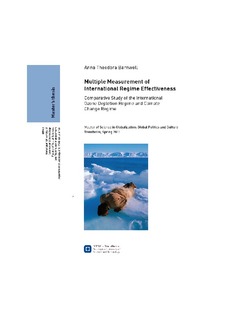Multiple Measurement of International Regime Effectiveness: Comparative Study of the International Ozone Depletion Regime and Climate Change Regime
Master thesis
Permanent lenke
http://hdl.handle.net/11250/268310Utgivelsesdato
2011Metadata
Vis full innførselSamlinger
Sammendrag
The study of international environmental regime effectiveness is contextualized in globalization. In this classificatory and comparative study, the cases of the ozone depletion regime and climate change regime are evaluated for their level of effectiveness. Regime effectiveness is conceptualized in a three-fold indicator operationalization of “output,” “outcome,” and “impact.” This multiple-measurement approach to regime effectiveness facilitates a robustness check of the levels of effectiveness of the ozone depletion regime and the climate change regime. The study employs an analytical framework based on the standards of collective optimum and goal attainment. The classification of regime effectiveness through this framework provides nuanced findings for each regime depending on which operationalization of effectiveness is applied. The comparison between the regimes finds that they are similar in terms of the outcome indicator, but vary significantly on the output and impact indicators, with the ozone regime scoring a high level of effectiveness and the climate regime ranking a low level of effectiveness. The findings emphasize areas of institutional design and scientific overlap between the regimes that could be used as a platform for a future explanatory study.
